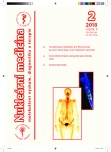Bone infarction mimicking osteosarcoma as an incidental finding – a case report
Authors:
Viera Rousková 1; Otto Lang 2
Authors‘ workplace:
Oddělení nukleární medicíny, Oblastní nemocnice Trutnov a. s., ČR
1; Oddělení nukleární medicíny, Oblastní nemocnice Příbram, a. s., ČR
2
Published in:
NuklMed 2018;7:32-35
Category:
Casuistry
Overview
Goal:
To present a SPECT/CT pattern of an incidentally detected bone infarction possibly mimicking osteosarcoma.
Case report:
84-y-old lady with a fracture of L3 was referred to our department for a bone scan. Images were acquired after injection of 800 MBq of 99mTc-HDP using a SPECT/CT gamma camera BrightView XCT with a flat panel (Phillips). We detected only mild degenerative changes of the spine without any increased bone metabolic turnover in the location of referred fracture. Unexpected patchy increased accumulation of the radiopharmaceutical was, however, clearly visible at the proximal part of the right tibia. SPECT/CT of this area was thus performed, which revealed intramedullary irregular well-defined shell-like sclerosis with relative central photopenia and well defined calcified margins without any periosteal reaction. We concluded this is and old bone infarction after consultation with radiologists.
Conclusion:
We present a pattern of bone infarction which can mimic osteosarcoma. Bone scan appearance of bone infarction changes according to its development from accumulation defect to increased accumulation. Nevertheless, there is a risk of osteosarcoma development at the location of bone infarction. It is also necessary to distinguish it from osteomyelitis especially in patients with a sickle cell disease.
Key Words:
bone infarction, bone scan, osteosarcoma, SPECT/CT
Sources
- Knipe H, Dixon A. Bone infarction. Dostupné na https://radiopaedia.org/articles/bone-infarction-1
- Skaggs DL, Kim SK, Greene NW et al. Differentiation between bone infarction and acute osteomyelitis in children with sickle-cell disease with use of sequential radionuclide bone-marrow and bone scans. J Bone Joint Surg Am. 2001;83-A:1810-1813
- Stacy GS, Lo R, Montag A. Infarct-Associated Bone Sarcomas: Multimodality Imaging Findings. AJR 2015; 205:W432–W441
- Endo M, Yoshida T, Yamamoto H et al. Low-grade central osteosarcoma arising from bone infarct. Human Pathology 2013;44 : 1184–1189
- Domson GF, Shahlaee A, Reith JD et al. Infarct-associated Bone Sarcomas. Clin Orthop Relat Res 2009;467 : 1820–1825
- Fondi C, Franchi A. Definition of bone necrosis by the pathologist. Clinical Cases in Mineral and Bone Metabolism 2007;4 : 21-26
- Masi L, Brandi ML. Gaucher disease: the role of the specialist on metabolic bone diseases. Clin Cases Miner Bone Metab 2015;12 : 165–169
- Khan AA, Morrison A, Hanley DA et al. Diagnosis and management of osteonecrosis of the jaw: a systematic review and international consensus. J Bone Miner Res 2015;30 : 3-23
- Haworth AE, Webb J. Skeletal complications of bisphosphonate use: what the radiologist should know. The British Journal of Radiology 2012;85 : 1333–1342
- Greyson ND, Kassel EE. Serial Bone-Scan Changes in Recurrent Bone Infarction. J Nucl Med 1976;17 : 184-186
- Lim JTE, Moncayo VM, Alazraki N. Sodium 18F-Fluoride Bone Scintigraphy in Deep Ocean Diver. Clin Nucl Med 2015;40 : 582–584
- Gregg PJ, Walder DN. Scintigraphy versus radiography in the early diagnosis of experimental bone necrosis, with special reference to caisson disease of bone. J Bone Joint Surg Br 1980;62-B:214-221
- Zhang Y, Zhao C, Liu H et al. Multiple metastasis-like bone lesions in scintigraphic imaging. J Biomed Biotechnol. 2012;2012 : 957364. doi: 10.1155/2012/957364
- Morton KA, Clark PB: Diagnostic Imaging Nuclear Medicine: 1. vydání, 2007
- Sabaté-Llobera A, Notta PC, Pons-Escoda A et al. Scintigraphic depiction of non-ossifying fibromas and the role of SPECT/CT. Rev Esp Med Nucl Imagen Mol. 2015;34 : 181-184
Labels
Nuclear medicine Radiodiagnostics RadiotherapyArticle was published in
Nuclear Medicine

2018 Issue 2
Most read in this issue
- Bone infarction mimicking osteosarcoma as an incidental finding – a case report
- Evaluation of the effectiveness of radioiodine ablation for differentiated thyroid carcinoma at low-risk patients
